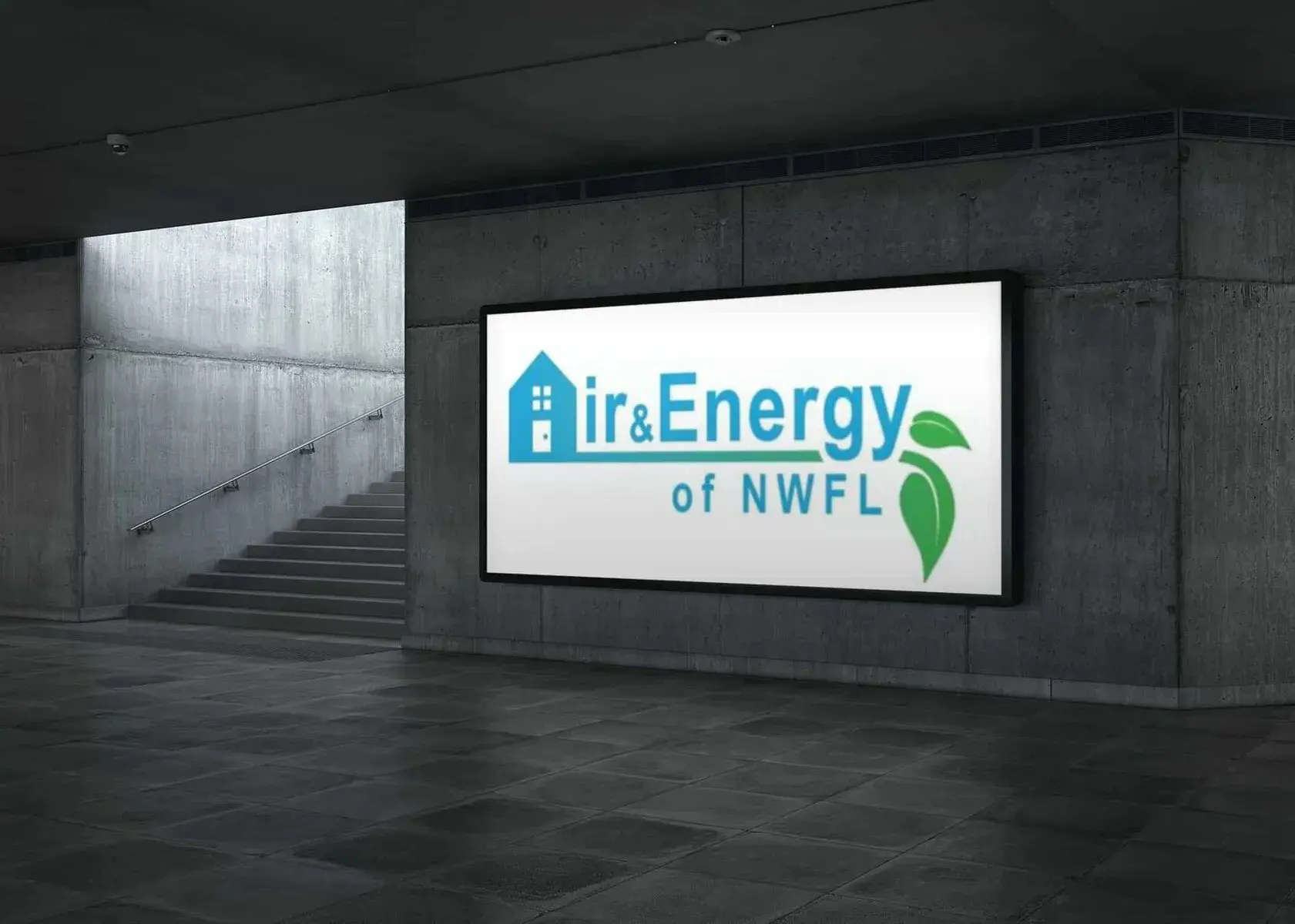Many of us take the luxury of air conditioning for granted, especially in hot regions of the world. When your air conditioning system breaks and not blowing cool air or you find your AC unit fan is not spinning, it can quickly ruin your day.
Malfunctioning air conditioners may have several reasons for not operating properly, including a bad run capacitor, a faulty condenser or breaker, or any number of parts that go bad that need replacing or repairing.
Our heating and cooling experts list a few tips to narrow down the possibilities for an AC fan that isn't spinning.
When capacitors aren’t the problem, there’s always Air & Energy of NWFL to get the fan spinning again. If you feel out of your depth, call one of our HVAC service technicians for a professional fix that works around your schedule.
Problem 1: Your AC Fan is Not Spinning

Noticing your AC fan is not spinning is the essential first step. Still, it is impossible to tell whether it is an electric motor problem, a condenser unit, or something that needs our immediate professional service.
The next task is to determine whether your outdoor AC unit is still working or doing strange things, like heating instead of cooling.
Listen for the air compressor—if your AC unit emits a buzzing noise, the issue is most likely localized to the fan capacitor or motor. If you don't hear the compressor, the scenario might be more serious.
If the heating or AC unit's fan isn't running, but you can still hear the motor running, it may indicate a malfunctioning start capacitor for the fan itself.
When your air conditioning and heating unit starts, the capacitor jump-starts the fan motor to get everything running smoothly. Luckily, a bad capacitor is far easier to replace than a motor.
Issues with capacitors are only slightly complicated in that starting the fan uses much more energy than simply keeping it spinning. You may not notice a bad capacitor until it's too late.
Solution: "Push" the Fan Blades
On some occasions, it is possible to jump-start your air conditioner's fan in your air conditioning unit simply by pushing them. The AC draws much lower energy to keep the fan blades spinning than starting the process, so a little pressure might be enough to get the motor running temporarily.
However, you should always push the fan blades with a long object through the fan grate, such as a stick. Fans could easily slice fingers after a temporary start. You should also take care not to use a conductive metal stick in this scenario.
It is not a permanent fix, and the fan will still need our HVAC technician's services to check the capacitor, compressor contactor, breaker, thermostat, and compressor unit for other issues. The next time the fan stops (or the capacitor runs out of voltage), it will shut off again.
If your air conditioning condenser fan motor doesn't start after a push, try to switch off the unit and call our HVAC professional for a service to check the start capacitor.
If you don't turn off the power to your AC, you run the risk of heating the unit's compressor past its limits as it attempts to cool your home without a functioning fan.
If the fan doesn't start to spin on its own, it might be more than a bad start capacitor or contactor. For instance, the indoor or outdoor unit could be suffering from a bad fan motor or compressor issues.
Problem 2: AC Fan Spins Slowly
If your AC fan isn't spinning as fast as it should, the central heating and cooling systems in your home or office will suffer. A slow fan impacts your AC unit's cooling power, but extended use can harm other HVAC system components as well.
For example, if a thermostat is too low and the faulty fan inhibits the HVAC function, an AC will be working harder to cool your home. It will draw more power in this scenario, but the strain could heat different fan motors and condensers to a breaking point.
You don't want your HVAC systems running harder to compensate for a bad fan or capacitor.
Solution: Check the Air Filter

Like the car AC, the air conditioner unit at home has an air filter that catches dust and other outdoor particles. If the capacitor breaks or you can't get the fan in your AC unit to blow at its normal speed—especially after a manual intervention—the problem is likely a clogged air filter.
When an air filter is dirty, the fans in your unit must work harder to push air through it. It makes the fan motor consume more energy and run hot. Eventually, you’ll have a bad fan motor on your hands if you don't catch the problem early.
A dirty air filter can cause your AC to short cycle as well as cause your evaporator coil to freeze up, which are both tell-tale signs you have an issue.
While our HVAC technicians will check the air filters in your home during maintenance, regularly checking these filters yourself helps considerably.
Replacing a clogged air filter is as simple as replacing a capacitor for our professionals. It prevents outdoor contaminants from causing system AC problems and circumvents more serious issues with the compressor.
A bad fan motor fix can be an expensive service, so due diligence pays in this scenario.
Problem 3: AC Fan Motor Spins Slowly and Makes Noise
If you can see your AC fan spin, but it isn't spinning at its usual speed, several components could be the problem. Debris in the fan or wrapped around the fan axle is a common cause of this type of air conditioning problem, but there may be problems even without debris.
A good way to check whether your fan could be meeting resistance is to listen for grinding or grating noises. If leaves, sticks, or weeds are trapped in your system, they are audible when the fan is spinning. If the debris accumulates enough, it could stop the system altogether.
Sharp objects or bulky debris in your AC fan or capacitor can result in a broken belt, broken motors, contactor issues, compressor or system problems, and more.
Solution: Remove Debris Regularly

The best way to save your fan motor from debris (and ensure the expensive compressor is well-maintained) is to inspect the unit regularly.
Depending on your AC model, you may be able to do this by looking inside. If not, one of our HVAC services can conduct professional maintenance to clean and inspect your unit's interior regularly.
It's also helpful to install the AC unit somewhere that’s partially sheltered from the elements. While dust is unavoidable, you can protect the unit from sticks, leaves, and other outdoor hazards with cages or overhangs as long as these structures don't impede airflow.
Problem 4: AC Fan Isn't Spinning and Makes No Noise
If you find your outside AC fan not spinning and you can't hear any noise from the system, don't assume the worst. Often, an AC unit might be in working condition but experiencing outside electrical issues.
If you find the AC fan not spinning or that the air conditioner or compressor isn’t running, it’s never too late to rule out a simple explanation.
Before you take the unit apart or schedule a service appointment with our HVAC repair professional, do some investigation. Open the service panel and check for irregularities. If something doesn't look right, it might be the problem.
Solution: Investigate Electrical Issues

AC units consume a lot of electrical power, and it's not uncommon to flip a circuit breaker. Be sure to check your circuit breaker panel box and switch on any tripped breaker to test the system. Are the breakers to the AC and air Handler in the 'on' position?
If possible, switch off the circuit breaker that serves your AC for a few seconds, and then switch it back on to see if the problem persists (a repeat might solve the problem as well).
If a tripped breaker is not the problem, the power issue likely comes from an internal electric source, such as thecompressor, condenser, capacitor, or contactor.
It's tough (and dangerous) to attempt to find the issue or replacement point in the system without professional knowledge. Instead of digging around in a compressor, high voltage panel, or electrical cables, call our HVAC technician for quick and reliable assistance.
Problem 5: AC Fan Won't Stay On
If your AC is running, but it won't stay active long enough to properly cool your home, consider energy problems that might shut the AC down repeatedly.
Usually, an AC unit that turns on and off a lot indicates an external issue that would need our immediate attention.
Repeated shut-offs and start-ups quickly damage an appliance, and our experts recommend addressing the problem as soon as possible.
Solution: Call Our Air Conditioning Experts

Without HVAC experience or the knowledge to diagnose bad electric components, contacting our repair professionals is the best choice.
In this scenario, internal capacitors are responsible for keeping the fan running, and it is essential to measure the voltage properly if there is going to be a replacement required.
Leave the power issues and complicated electric repair to our quality HVAC specialists. It’s complicated and dangerous work, but we’re fully insured and equipped with years of experience and training. Plus we have awesome customer service for that stress-free experience!
If your AC fan isn't spinning or not blowing cold air and you think your HVAC unit needs maintenance or repair, call Air & Energy of NWFL today at (850) 477-7101 to set up a service appointment.
Our quality team will repair or replace any AC, condenser fan, compressor, capacitor, contactor, or anything else that will restore your comfort.

This article was written by:
Co-founder and Home Comfort Specialist

